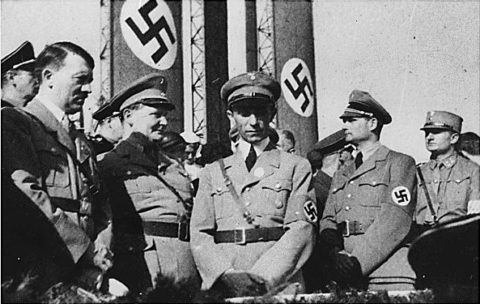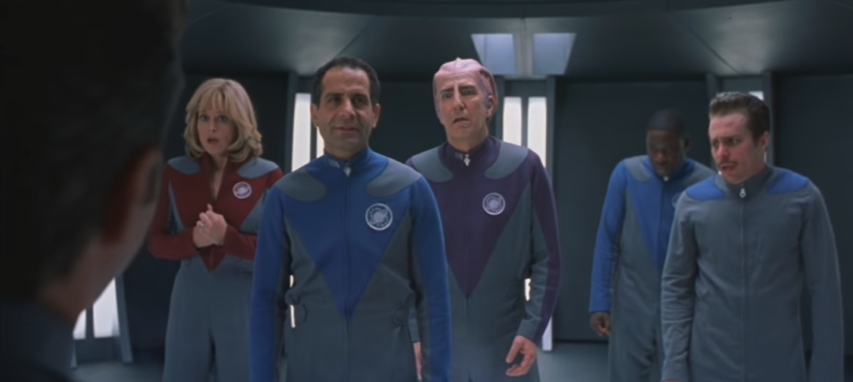Overly Sarcastic Productions
Published 21 Dec 2018Have a holly, jolly christmas! Spend time with your family, eat tons of good food, and don’t forget to ponder the looming specter of your mortality and the worth of how you’ve spent your fleeting existence!
PATREON: https://www.patreon.com/user?u=4664797
MERCH LINKS:
Shirts – https://overlysarcasticproducts.threa…
All the other stuff – http://www.cafepress.com/OverlySarcas…Find us on Twitter @OSPYouTube!
December 19, 2019
Modern Classics Summarized: A Christmas Carol
November 18, 2019
Fungus rock – the great placebo treasure (and the Mujahideen)
Lindybeige
Published 5 Jun 2015Support me on Patreon: https://www.patreon.com/Lindybeige
The things that people valued and fought over in the past were not as they are now. You might not guess the tremendous significance of one tiny island off the coast of Gozo.
NEWS FLASH (March 8th 2017): the Azure Window, featured in this video, has collapsed into the sea.
More videos from Malta to follow.
Lindybeige: a channel of archaeology, ancient and medieval warfare, rants, swing dance, travelogues, evolution, and whatever else occurs to me to make.
▼ Follow me…
Twitter: https://twitter.com/Lindybeige I may have some drivel to contribute to the Twittersphere, plus you get notice of uploads.
website: http://www.LloydianAspects.co.uk
Fungus rock – the great placebo treasure
November 17, 2019
November 8, 2019
Shakespeare Summarized: Macbeth
Overly Sarcastic Productions
Published 12 April 2014Here it is! The Scottish Play. The bloodiest of the bloody. An epic tale of magic, madness and stabbing. It’s so gory, even Tarantino thinks it’s over the top.
Making it funny was pretty tough. 😀
November 2, 2019
When entertainment morphs into propaganda
One of the key elements aiding Hitler and the NSDAP to take power and stay in power in Germany in the 1930s was the constant, ongoing propaganda campaign orchestrated by Joseph Goebbels. Hitler and the Nazi party were lauded as the perfect Germanic solution to every problem and Jews, socialists, homosexuals, and other undesireable elements were belittled and used as targets of hate. A big part of Goebbels’ propaganda revolved around one idea, the “Big Lie”:
If you tell a lie big enough and keep repeating it, people will eventually come to believe it. The lie can be maintained only for such time as the State can shield the people from the political, economic and/or military consequences of the lie. It thus becomes vitally important for the State to use all of its powers to repress dissent, for the truth is the mortal enemy of the lie, and thus by extension, the truth is the greatest enemy of the State.
By suppressing competing voices and having all the methods of reaching the people repeating the same story, the Nazis solidified their control on power in Germany that lasted until 1945, and was only demolished by massive military effort by the United States, the Soviet Union, and the British Commonwealth. Propaganda is a very powerful tool that works distressingly well to implant and nurture evil ideas in a subject population.
Modern propagandists in the west generally don’t have the power of the state aiding them, but if they get enough of the channels of communication — especially the entertainment channels — to co-ordinate the message, the effects can be very strong:
… I perfectly understand the legitimacy of feminist concerns regarding the portrayal of women in the media as consistently demure, retiring, and subservient to men. I grant that, in most of the action/adventure movies that I saw growing up, women would typically twist an ankle or get captured and then require rescuing by the swashbuckling male hero — and I realize how galling this must have been to generations of women. And therefore, a certain correction was undoubtedly in order. But what is problematic now is the Nietzschean quality of the reaction, by which I mean, the insistence that female power has to be asserted over and against males, that there is an either/or, zero-sum conflict between men and women. It is not enough, in a word, to show women as intelligent, savvy, and good; you have to portray men as stupid, witless, and irresponsible. That this savage contrast is having an effect especially on younger men is becoming increasingly apparent.
In the midst of a “you-go-girl” feminist culture, many boys and young men feel adrift, afraid that any expression of their own good qualities will be construed as aggressive or insensitive. If you want concrete proof of this, take a look at the statistics contrasting female and male success at the university level. And you can see the phenomenon in films such as Fight Club and The Intern. In the former, the Brad Pitt character turns to his friend and laments, “we’re thirty year old boys;” and in the latter, Robert De Niro’s classic male type tries to whip into shape a number of twenty-something male colleagues who are rumpled, unsure of themselves, without ambition — and of course under the dominance of an all conquering female.
It might be the case that, in regard to money, power, and honor, a zero-sum dynamic obtains, but it decidedly does not obtain in regard to real virtue. The truly courageous person is not threatened by another person’s courage; the truly temperate man is not intimidated by the temperance of someone else; the truly just person is not put off by the justice of a countryman; and authentic love positively rejoices in the love shown by another. And therefore, it should be altogether possible to hold up the virtue of a woman without denying virtue to a man. In point of fact, if we consult the “all conquering female” characters in films and TV, we see that they often exemplify the very worst of the traditional male qualities: aggression, suspicion, hyper-sensitivity, cruelty, etc. This is what happens when a Nietzschean framework has replaced a classical one.
My point is that it is altogether possible — and eminently desirable — to say “you go boy” with as much vigor as “you go girl.” And both the boys and the girls will be better for it.
October 30, 2019
Shakespeare Summarized: Julius Caesar
Overly Sarcastic Productions
Published 1 Dec 2013Here we go again! It’s only taken me several months…
Sarcastified Shakespeare returns, this time with a look at that historical tragedy we all love to write essays about, Julius Caesar!
I think the real main character here was Brutus’s crippling self-esteem issues…
October 22, 2019
Shakespeare Summarized: Hamlet
Overly Sarcastic Productions
Published 13 April 2013Well, this one is longer than the last one, but in fairness it’s 2000% shorter than the actual movie.
Continuing the trend, this video summarizes THE TRAGEDIE OF HAMLET PRINCE OF DENMARK, commonly known as Hamlet.
Goodness, he really is a whiner, isn’t he? And he’s supposed to be the sympathetic character!
Note: This is the second version of Hamlet Summarized, because I made the mistake of using a copyrighted song in the last one. Oops.
October 2, 2019
That Downfall Scene Explained – What Is Hitler Freaking Out About? I 16 Days In Berlin
The Great War
Published on 1 Oct 2019Thank you for your support for 16 Days in Berlin: https://realtimehistory.net/indiegogo
» SUPPORT THE CHANNEL
Patreon: https://www.patreon.com/thegreatwar
Merchandise: https://shop.spreadshirt.de/thegreatwar/»CREDITS
Presented by: Jesse Alexander
Written by: Jesse Alexander
Director: Toni Steller & Florian Wittig
Director of Photography: Toni Steller
Sound: Toni Steller
Editing: Toni Steller
Mixing, Mastering & Sound Design: http://above-zero.com
Maps: Daniel Kogosov (https://www.patreon.com/Zalezsky)
Research by: Jesse Alexander
Fact checking: Florian WittigChannel Design: Alexander Clark
Original Logo: David van StepholdA Mediakraft Networks Original Channel
Contains licensed material by getty images
All rights reserved – Real Time History GmbH 2019
September 8, 2019
QotD: The Amritsar massacre and the partition of India
Although the movie [Gandhi] sneers at this reasoning as being the flimsiest of pretexts, I cannot imagine an impartial person studying the subject without concluding that concern for Indian religious minorities was one of the principal reasons Britain stayed in India as long as it did. When it finally withdrew, blood-maddened mobs surged through the streets from one end of India to the other, the majority group in each area, Hindu or Muslim, slaughtering the defenseless minority without mercy in one of the most hideous periods of carnage of modern history.
A comparison is in order. At the famous Amritsar massacre of 1919, shot in elaborate and loving detail in the present movie and treated by post-independence Indian historians as if it were Auschwitz, Gurkha troops under the command of a British officer, General Dyer, fired into an unarmed crowd of Indians defying a ban and demonstrating for Indian independence. The crowd contained women and children; 379 persons died; it was all quite horrible. Dyer was court-martialed and cashiered, but the incident lay heavily on British consciences for the next three decades, producing a severe inhibiting effect. Never again would the British empire commit another Amritsar, anywhere.
As soon as the oppressive British were gone, however, the Indians — gentle, tolerant people that they are — gave themselves over to an orgy of bloodletting. Trained troops did not pick off targets at a distance with Enfield rifles. Blood-crazed Hindus, or Muslims, ran through the streets with knives, beheading babies, stabbing women, old people. Interestingly, our movie shows none of this on camera (the oldest way of stacking the deck in Hollywood). All we see is the aged Gandhi, grieving, and of course fasting, at these terrible reports of riots. And, naturally, the film doesn’t whisper a clue as to the total number of dead, which might spoil the mood somehow. The fact is that we will never know how many Indians were murdered by other Indians during the country’s Independence Massacres, but almost all serious studies place the figure over a million, and some, such as Payne’s sources, go to 4 million. So, for those who like round numbers, the British killed some 400 seditious colonials at Amritsar and the name Amritsar lives in infamy, while Indians may have killed some 4 million of their own countrymen for no other reason than that they were of a different religious faith and people think their great leader would make an inspirational subject for a movie. Ahimsa, as can be seen, then, had an absolutely tremendous moral effect when used against Britain, but not only would it not have worked against Nazi Germany (the most obvious reproach, and of course quite true), but, the crowning irony, it had virtually no effect whatever when Gandhi tried to bring it into play against violent Indians.
Despite this at best patchy record, the film-makers have gone to great lengths to imply that this same principle of ahimsa — presented in the movie as the purest form of pacifism — is universally effective, yesterday, today, here, there, everywhere. We hear no talk from Gandhi of war sometimes being a “necessary evil,” but only him announcing — and more than once — “An eye for an eye makes the whole world blind.” In a scene very near the end of the movie, we hear Gandhi say, as if after deep reflection: “Tyrants and murderers can seem invincible at the time, but in the end they always fall. Think of it. Always.” During the last scene of the movie, following the assassination, Margaret Bourke-White is keening over the death of the Great Soul with an English admiral’s daughter named Madeleine Slade, in whose bowel movements Gandhi took the deepest interest (see their correspondence), and Miss Slade remarks incredulously that Gandhi felt that he had failed. They are then both incredulous for a moment, after which Miss Slade observes mournfully, “When we most needed it [presumably meaning during World War II], he offered the world a way out of madness. But the world didn’t see it.” Then we hear once again the assassin’s shots, Gandhi’s “Oh, God,” and last, in case we missed them the first time, Gandhi’s words (over the shimmering waters of the Ganges?): “Tyrants and murderers can seem invincible at the time, but in the end they always fall. Think of it. Always.” This is the end of the picture.
Richard Grenier, “The Gandhi Nobody Knows”, Commentary, 1983-03-01.
August 22, 2019
QotD: Stars of the silver screen
There have always been gold-diggers – considering the intellectual castration of women historically, it would have been lunacy for bright broads not to attempt to gain wealth by any means necessary. During the Golden Age of Hollywood, they were often the wittiest and warmest onscreen female role models around; ironically, the women who played them were grafters, rarely asking for anything during any of their multiple divorces. There’s a story about Ava Gardner, Rita Hayworth and Lana Turner going home early from a Hollywood party to be ready in time for the studio dawn call as a trio of expensive call girls sweep in just getting ready to get started on some serious fun. One of the sex goddesses remarks to the others: “We picked the wrong job!” Of course she was kidding – an ageing hooker has about as much prestige as an ageing racehorse. But there’s something admirably realistic about a gold-digger who knows she’s one.
Julie Burchill, “The Princess generation needs to grow up”, The Spectator, 2017-07-18.
August 21, 2019
Summer Stupidity: GLADIATOR (Media Review!)
Overly Sarcastic Productions
Published on 20 Aug 2019The first time I saw Gladiator (2000) was in Latin class, and I have maintained since that first viewing that this movie rules.
Just pretend it’s historical fiction and the emperors are named literally anything else, and you’re set.
PATREON: https://www.Patreon.com/OSP
DISCORD: https://discord.gg/sS5K4R3
MERCH LINKS: https://www.redbubble.com/people/OSPY…
OUR WEBSITE: https://www.OverlySarcasticProductions.com
Find us on Twitter https://www.Twitter.com/OSPYouTube
Find us on Reddit https://www.Reddit.com/r/OSP/
August 14, 2019
Summer Stupidity: Hercules 2014 (Media Review!)
Overly Sarcastic Productions
Published on 13 Aug 2019“I’ve seen The Rock act before and he’s really fun and charismatic! Surely this movie starring him will be a Good Time!” I thought, foolishly.
PATREON: https://www.Patreon.com/OSP
MERCH LINKS: https://www.redbubble.com/people/OSPY…
OUR WEBSITE: https://www.OverlySarcasticProductions.com
Find us on Twitter https://www.Twitter.com/OSPYouTube
Find us on Reddit https://www.Reddit.com/r/OSP/
July 15, 2019
Galaxy Quest – still the best Star Trek movie ever made
At Mark Steyn’s site, guest movie reviewer Kathy Shaidle lovingly reviews the cult classic — and one of my all-time favourite movies — Galaxy Quest:
In a just world, O.J. Simpson would currently be serving the 24th year of a double life sentence; Ronald Reagan would have been president during America’s bicentennial instead of Jimmy Carter — and Galaxy Quest would’ve earned half-a-billion bucks at the box office when it came out in 1999.
But inept and indifferent studio marketing (plus competition from another “sci-fi” comedy, Ghostbusters) relegated Galaxy Quest to semi-cult status. Which is ironically appropriate, given its plot:
At a science fiction convention, fans await an appearance by the cast of Galaxy Quest, a hokey interstellar TV adventure series unceremoniously cancelled in the early 1980s. The show’s fatally typecast has-been “stars” (played by Tim Allen, Alan Rickman, Sigourney Weaver, Tony Shalhoub and Daryl Mitchell) are reduced to reluctantly signing autographs at tacky gatherings like this one, when they’re not cutting ribbons (in full costume) at supermarket openings.
That is, until genuine aliens — who, in cargo cult fashion, have based their civilization on Galaxy Quest re-runs transmitted through space — touch down and beg “the crew of the NSEA-Protector” to help them defeat the villain bent on destroying their planet. The adorable Thermians innocently believe the program’s “crew” are fearless, intrepid space warriors and technological geniuses, not just washed-up actors in laughable uniforms. Their language has no word for “pretend”…
Lazily calling this movie “a Star Trek spoof” unfairly slots it alongside broad, coarse parodies like Blazing Saddles or the soulless Mars Attacks! In truth, Galaxy Quest is a tender, big hearted valentine — more My Favorite Year than Airplane.
That the film’s jokes and, more incredibly, its special effects, hold up so well twenty years later is a testament to the loving care with which Galaxy Quest was crafted. Obeying the first (yet often ignored) commandment of movie comedy, all the actors “play it straight”
June 30, 2019
“The Godfather Theme” Bagpipes – The Snake Charmer Cover
TheSnakeCharmer
Published on 30 Aug 2017The Godfather Main theme song is a highly requested cover that i had to play on my bagpipes. This is “Speak softly love” and some bits from The Waltz & love theme. Here is the bagpipe cover of the Godfather theme.
———————————————————————————-
If you like it please support me by being my Patreon
https://www.patreon.com/thesnakecharmerBuy this Track on:
iTunes – http://apple.co/2xPttlD
Google Play – http://bit.ly/2eHEjTJ
—————————————————————-
Don’t forget to Like, Share and SubscribeLocation Courtesy – The Piano Man (Jazz Club), New Delhi
Thank you for your beautiful space – https://goo.gl/HnwpJ6
June 20, 2019
A Clockwork Orange – Dystopias and Apocalypses – Extra Sci Fi
Extra Credits
Published on 18 Jun 2019Go to https://NordVPN.com/ExtraCredits to get 75% off a 3 year plan and use code
ExtraCreditsto get an extra month free. Protect yourself online today!A Clockwork Orange reflects a cultural fear of society’s moral decay in the 1960s. Its usage of a mashup slang language known as “nadsat” illustrates the complexities of rebellious youth culture. Ultimately, Anthony Burgess’s work asks us to think about if or when free will should ever be suppressed, but the major differences between the book and the film version of this story present contrasting takeaways.
Where the dystopias of Brave New World and 1984 warned against the easy slide into totalitarianism, and painted for us worlds in which freedom is nearly a forgotten thing… A Clockwork Orange presents us with a protagonist who has almost an excess of freedom, and in doing so it shows us the shift in societal fears.
















